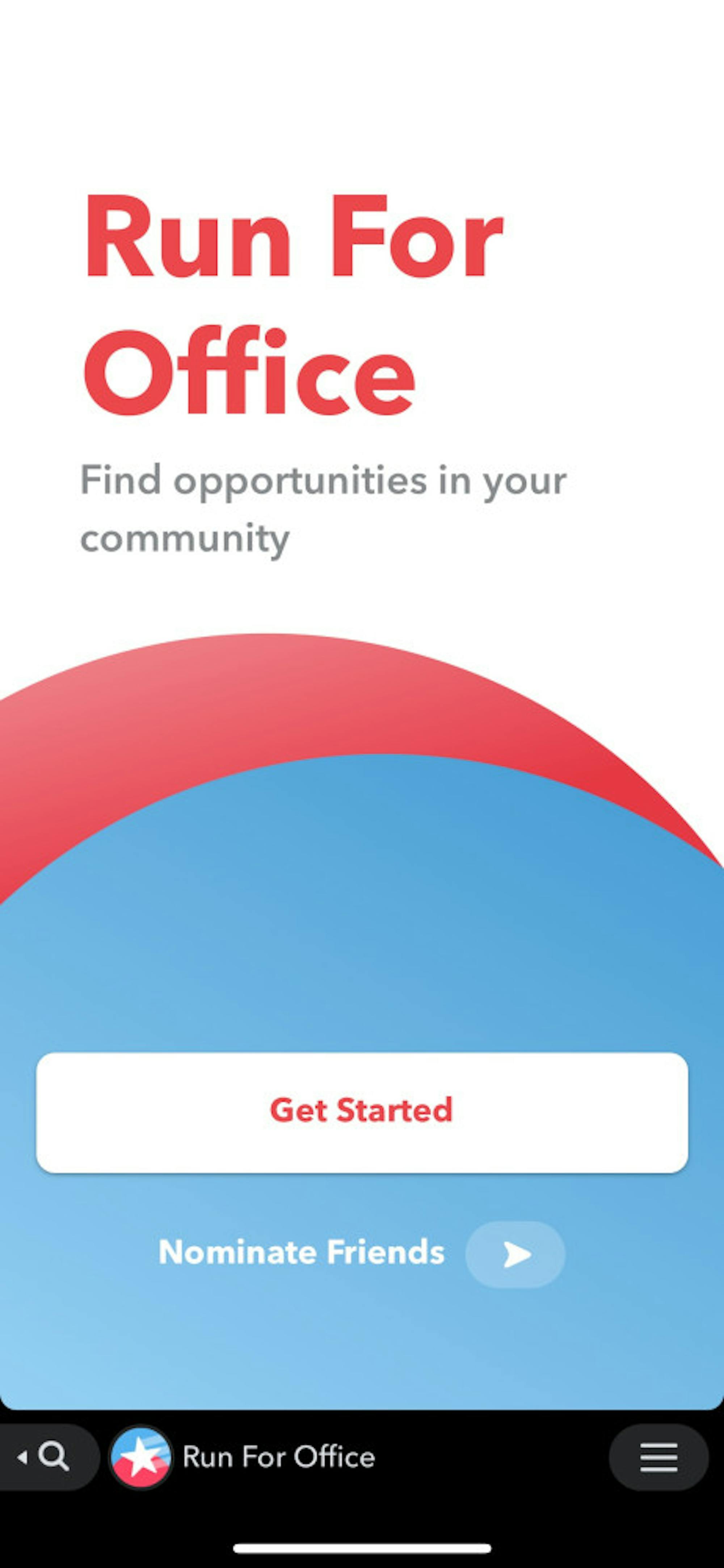In collaboration with the Center for Information and Research on Civic Learning and Engagement, Snap Inc. has developed the Run for Office Mini, an application built directly into Snapchat to emphasize civic engagement among the app’s users.
According to Sofia Gross, head of policy partnerships and social impact at Snap Inc., Snapchat’s Run for Office Mini helps users easily find races that they wish to contest.
“When you log into Snapchat and search ‘run for office,’ you will be prompted to enter your zip code and then pick the issues you care most about to select from over 75,000 different elections happening across this country to understand what you can run for in your local community,” Gross said.
Snapchat has a short but deep history of building civic responsibility among its users. The company began its active involvement in civics before the 2016 election when it first developed a news and politics team to help educate its users about the Iowa caucuses and nomination procedures.
By the 2018 midterm elections, Snapchat built a service into its users’ profiles that helped them register to vote. The company took this a step further by the 2020 election, when Snapchat partnered with TurboVote to build a Register to Vote Mini. According to Gross, this helped over 1.2 million Snapchat users register to vote before the 2020 election.
Gross explained that Snapchat developed the Run for Office Mini after learning that a significant number of elections went uncontested in 2020.
“When we learned that 70% of races across the country went uncontested in 2020, we wanted to help build a tool to show people how they could make their voice heard on the issues they care most about,” Gross said.
Snapchat’s user base is mostly made up of younger Americans, a group that, according to Gross, includes some of the most civically engaged people in the country.
“We’re reaching a really special demographic of Americans,” Gross said. “We want to help break down the barriers to entry when it comes to civic participation [for them].”
Civic engagement experts at Tufts University discussed how youth engagement can affect national politics.
According to Director of CIRCLE Kei Kawashima-Ginsberg, young voters are incredibly motivated and focus their activism and electoral participation around a few key issues. She mentionedgun control, climate change and the Black Lives Matter movement as some of the issues that are driving youth political participation right now.
Kawashima-Ginsbergbelieves that engaging more young people in politics could also push politics to focus more on the country’s long-term success. She noticed that many politicians currently are mostly worrying about short-term issues. Meanwhile, youth activists are thinking about how their actions will be effective long into the future.
“Politics and campaigns have always run [around] what’s going to happen next year, [in the] next two years,” Kawashima-Ginsberg said. “These young people … think about the next 30 years.”
Adam Gismondi, director of impact at Tisch College’s Institute for Democracy and Higher Education,discussed howsocial media has facilitated civic engagement and increased social awareness among its users.
“Social media has … lowered the barrier to entry in some ways, whether it’s staying aware of what’s in the news or doing a deeper dive on an issue that you’re interested [in], to doing something like organizing your peers,” Gismondi said.
Ultimately, the Run for Office Mini is one of multiple tools Snapchat is using to encourage political engagement among its users.
“Personally, I’m thrilled to see young people getting engaged, whether that takes the form of running for office or being an activist or just staying up on issues,” Gismondi said.
Importantly, Kawashima-Ginsberg pointed out that the Run for Office Mini highlights local races, which are often overlooked in favor of showy, federal elections. She believes that running for local elections is a great way to get involved in politics.
“Instead of running for Congress for the first time that you’re running for office, now you can imagine running for a community board, which is a much more accessible pathway,” Kawashima-Ginsberg said.
By directly reaching members of younger generations, Snapchat’s Run for Office Mini can address some of the concerns Gismondi and Kawashima-Ginsberg raised about lowering barriers to entry for political participation and amplifying the youth voice in government.
Gismondi believes the presence of younger political candidates in any race will also improve representation in politics. According to the Library of Congress, the average age of a federal representative in the 117th Congress is 58.4, while the average age of a senator is 64.3.
“The only way to increase representation, which I think is really important in politics, is for the youngest generation to take their seat at the table,” Gismondi said.
Kawashima-Ginsberg believes that encouraging young people to run for office will add yet another way for young activists to succeed in their goals. While voting and organizing are indeed powerful means of affecting change, running for office expands the opportunities that voting and organizing can provide.
“Oftentimes we feel really disconnected and disempowered, because we don't know what's going to happen to us and we don't even know who's making our decision on our behalf," she said. "The reason to have young people run for office, and be able to have that voice in the local, state and national government is [so] that … the young people can actually have an opinion that's going to travel and translate into policy and practice."






